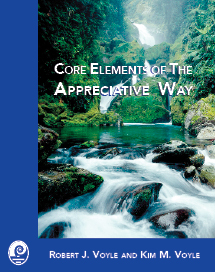

Director of TrainingThe Rev. Dr. Rob Voyle is a leader in the development of appreciative inquiry based leadership training and coaching in church related settings. Program AdministratorThe Dr. Kim Voyle the Administrator of our Training Programs is also the Founder and Director of Pathfinders Career Services. New Resource!
Introducing Yes!3Yes!3 is designed to help you
Yes! To God |
Our History and BackgroundThe Clergy Leadership Institute was started by the Rev. Robert J. Voyle, an Episcopal priest, psychologist and executive coach. Most of my 25 years of church ministry was as an interim pastor helping congregations through transitions of leadership. Out of my parish experience has arisen three major convictions: 1. The greatest need for the church today is to train clergy to be leaders. For the past 50 years the majority of the church's applied theology training has been in the area of counseling and chaplaincy training. Programs such as Clinical Pastoral Education have been highly effective in training people to be sensitive pastors and care givers especially to people distressed and in times of need. While these are wonderful skills and the church needs people able to offer these ministries such as chaplains, these abilities are insufficient to lead groups of people to accomplish the Church's mission. Chaplains are skilled in helping people regain their emotional and spiritual well-being after they have suffered a loss of well-being. However, if we are to move the church from a maintenance to a mission mode of being in the world then we will need to train leaders and not just chaplains. In essence chaplains are oriented to help us to maintain what we have. Leadership is about leading people to create a preferred future. I say this not to disparage chaplaincy or the pastoral training process. It is my personal background and one of my first loves in ministry, that led me to being licensed and work as a clinical psychologist. Yet all that training didn't help me lead people. My skill was in helping individuals and in not leading groups of people to accomplish new things. 2. Many attempts to do congregational development are limited by the prevailing pathology focussed orientation of many organizational interventions. Most of these approaches have borrowed from medical models of pathology, which while effective in treating individuals with problems were less than helpful in dealing with systems of people, especially when many of the people in the system are healthy. Causative thinking leads to blame which leads to defensiveness. Defensiveness does not generate creativity, in fact it is the antithesis of creativity. The pathology focused orientation also leads to the notion that development occurs by solving problems or strengthening the weakest link in the system. This type of orientation is very linear and fixing weak links can be a huge time consuming distraction. From a systemic perspective the idea is to create a web or network so that the organization is not dependent on any one link. 3. The Appreciative Way embodied in a coaching model is a very effective way to train clergy to be leaders in the church. In the late 1990s I personally experienced a merging of several strands of thought. I learned about appreciative inquiry and became a leading exponent of the use of appreciative inquiry in church settings. Unlike the pathology based models of development, appreciative inquiry is a strength based approach that seeks to discover the best about the past and how to use that deliberately as a means for helping people design and create their preferred future. This approach has radically transformed the way I work with individuals and with church systems. At the time I was learning about appreciative inquiry I also discovered executive coaching and became involved in training psychologists and business people in the art of executive coaching from an appreciative perspective. Coaching offers a way for well functioning people to go forward into their future and is distinctly different from developmental models that are taken from the therapeutic world that is oriented to finding correction for past experiences. A common expression in the therapy world is that people need to come to terms with their past. From a coaching perspective the past isn't the issue, the future is, and what people need to come to terms with is their future. People will stay stuck in their past when they cannot envision a future that is desired and compelling. The appreciative coaching model is a way for people to discover their best and on that basis create their future. Also out of the coaching experience has come a knowledge of leadership development and a deep appreciation for the fact that leadership competencies can be taught and learned. These competencies cannot be learned simply from a book. They need to be practiced to make the competencies natural habits. Coaching during the learning process is an effective way for people to The Appreciative WayThe Appreciative Way is our synthesis of Appreciative Inquiry, the work of Milton Erickson, and Contemplative Spirituality. It is what I love to do, and it is why I started the Clergy Leadership Institute. Rob Voyle >> See Our Helpful, Humorous, Healing Approach to Training >> See a Listing of Our Current Training Programs >> See Our Appreciative Coaching Services |
Quick Links
Purchase Books Online
Appreciative InquiryOur foundational program that serves as an introduction for Coaching, Interim Ministry, and Leadership Development. Coach TrainingWe offer a unique coach training program that blends Appreciative Inquiry, the work of Milton Erickson, and Contemplative Spirituality. Leadership TrainingTake your ministry to another level by learning the core competencies of Appreciative Leaders. Interim MinistryWe use the Appreciative Way as the foundation for our year-long Certificate in Appreciative Interim Ministry training. >>
Appreciative Interim Ministry Continuing EducationWe are approved sponsors of Continuing Education for Psychologists and Coaches through the APA and BCC. Please contact Dr. Robert Voyle, if you have questions regarding the suitability of a program to meet your continuing education needs. Stay ConnectedReceive The Appreciative Way our Free Email Newsletter Subscribers receive monthly Appreciative Tips and advanced notification of our upcoming Training Programs. Privacy: We never rent, sell, or share your email. What Participants SayRob's training is full of heart, wit, and passion. "I have been fully engaged emotionally, intellectually, and spiritually.
Thank you for touching me at the core of my being." Rob will enhance your ability to delight in yourself, your neighbor and God through his insightful, practical, loving, professionally grounded, appreciative and often mischievous coaching and
teaching skills; and that will make you a better leader and citizen in God's creation. Rob's combination of organizational savvy, teaching skills, theological & spiritual integration, and ability to rapidly build supportive, learning communities is quite simply the best in any of
the churches today. |
|---|



